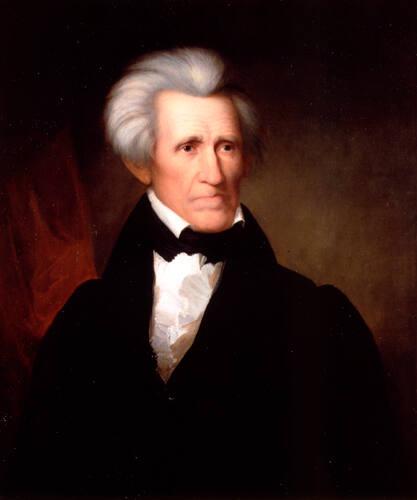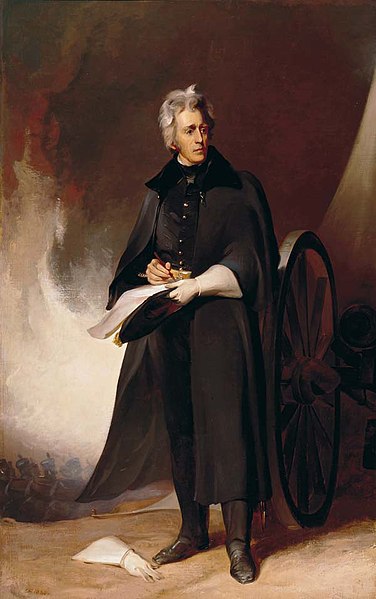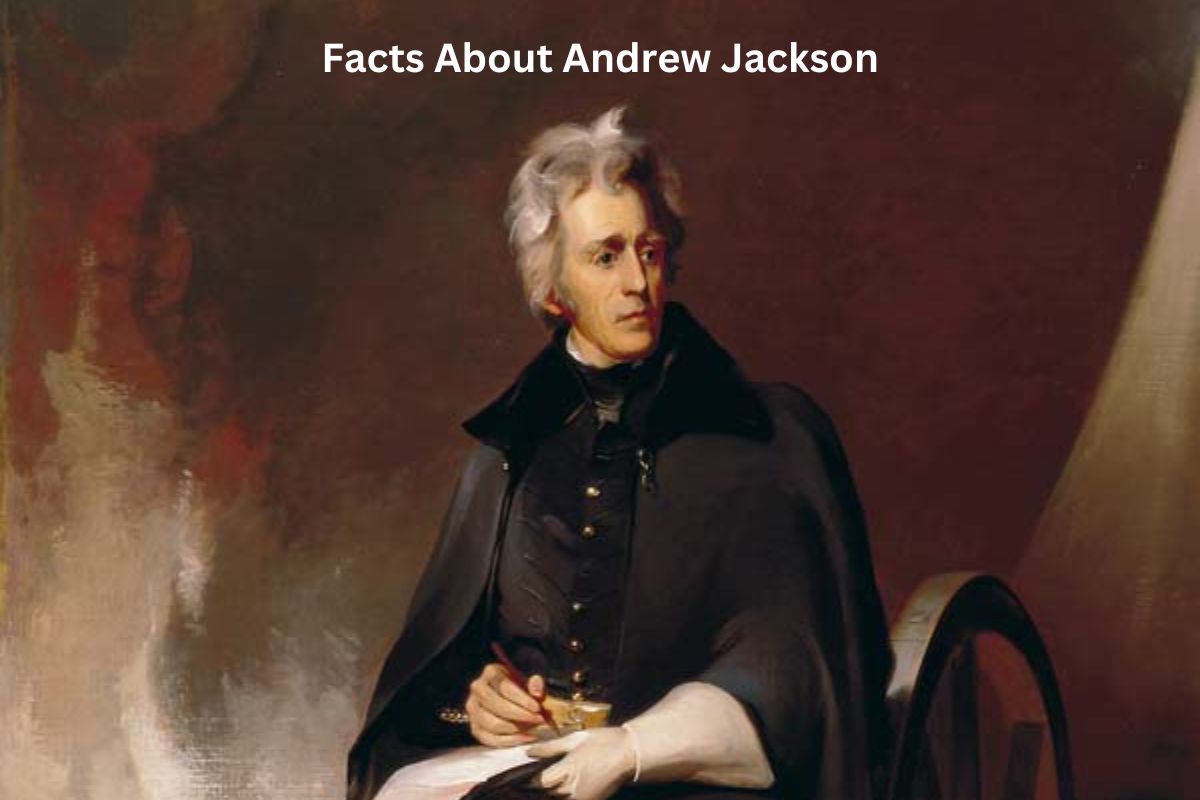Andrew Jackson, the seventh President of the United States, is a figure of both admiration and controversy in American history.
Born into humble beginnings in the Carolinas, he rose to prominence through his military heroics during the War of 1812 and later became known as “Old Hickory” for his unyielding character.
Jackson’s presidency, marked by confrontations like the Nullification Crisis and the Indian Removal Act, left a lasting impact on the nation.
In this exploration of Andrew Jackson’s life and legacy, we delve into some key facts that illuminate his journey from orphaned youth to one of the most influential figures in American history.
Andrew Jackson Facts
1. Born in the Carolinas in 1767
Andrew Jackson’s exact birthplace is disputed, but it is generally believed that he was born in the Waxhaws region, which straddled the border of North and South Carolina.
This region was a rural and frontier area during the 18th century, and Jackson’s humble beginnings shaped his character and worldview.

2. Orphaned at a young age
Jackson faced considerable adversity in his early life. His father, Andrew Jackson Sr., died in a logging accident just a few days before Andrew’s birth. Tragically, his mother, Elizabeth Jackson, died of cholera when he was only 14 years old.
Also Read: Andrew Jackson Timeline
This left him an orphan, and he and his older brother, Robert, had to fend for themselves. These early hardships instilled in Jackson a strong sense of self-reliance and resilience that would define his life.
3. Self-taught lawyer
Despite having limited access to formal education, Jackson was a determined and self-motivated individual. He worked as a saddle maker, schoolteacher, and even a law clerk before teaching himself the law.
He eventually moved to Nashville, Tennessee, in 1788 and established a successful law practice. His legal career played a crucial role in his rise to prominence in Tennessee and his later entry into politics.
Jackson’s success as a lawyer showcased his intelligence and determination, which would serve him well in his future endeavors, including his military and political career.
4. Military hero during the War of 1812
Andrew Jackson gained national prominence for his military leadership during the War of 1812. He was appointed as a major general in the United States Army and commanded American forces in the Southern theater of the war.
Also Read: Accomplishments of Andrew Jackson
His most famous victory came in the Battle of New Orleans in 1815, where he successfully defended the city against British forces. This victory made him a national hero and propelled him into the political spotlight.

5. Nicknamed “Old Hickory”
He earned the nickname “Old Hickory” due to his tough and resilient personality. It was given to him by his soldiers during his military campaigns, reflecting his unyielding and often stern demeanor. Jackson was known for his strong will and determination, and this nickname stuck with him throughout his life.
6. Seventh President of the United States
He was elected as the seventh President of the United States and served two terms from 1829 to 1837. He was the first president to hail from west of the Appalachian Mountains, symbolizing a shift in political power away from the Eastern elite.
Jackson’s presidency is often associated with the rise of Jacksonian democracy, characterized by an emphasis on the common man’s role in government.
However, it was also marked by controversy, including his confrontations with the Second Bank of the United States and the Indian Removal policy.
7. Faced the Nullification Crisis
During Andrew Jackson’s presidency, the Nullification Crisis emerged as a major challenge. It revolved around the issue of tariffs imposed by the federal government, which disproportionately affected Southern states, particularly South Carolina.
In 1832, South Carolina declared that it had the right to nullify or reject federal laws within its borders, including the tariffs. Jackson vehemently opposed this assertion of state sovereignty and believed it could lead to the dissolution of the Union.
He responded with the Nullification Proclamation and the Force Bill, which authorized the use of military force to enforce federal laws in South Carolina. Ultimately, a compromise was reached, and the crisis was defused, but it highlighted the tension between states’ rights and federal authority.

8. Signed the Indian Removal Act
In 1830, Andrew Jackson signed the Indian Removal Act into law, which provided for the forced removal of Native American tribes from their ancestral lands in the Southeastern United States to lands west of the Mississippi River.
This policy resulted in the tragic Trail of Tears, during which thousands of Native Americans, primarily from the Cherokee Nation, died due to exposure, disease, and starvation during their forced relocation. Jackson’s support for this policy remains a deeply controversial and dark chapter in American history.
9. Opposed the Second Bank of the United States
Andrew Jackson was a vocal opponent of the Second Bank of the United States, viewing it as a symbol of corruption and elitism. He believed the bank had too much power and favored the wealthy over the common people.
In 1832, Jackson vetoed the recharter of the bank, effectively causing its demise. This decision had a profound impact on American financial policy, leading to a period of economic instability known as the “Bank War.”
10. Survived an assassination attempt
In January 1835, while Jackson was President, he survived an assassination attempt. A disturbed house painter named Richard Lawrence approached Jackson with two pistols and attempted to shoot him.
Both pistols misfired, and Jackson, known for his physical toughness, proceeded to physically attack Lawrence with his cane. The attempt on his life cemented Jackson’s image as a strong and resilient leader, and he remained unharmed.
11. Engaged in several duels
Andrew Jackson was involved in several duels during his lifetime, reflecting the dueling culture of the time. Notable among these was his duel with Charles Dickinson in 1806. The dispute arose over insults exchanged between Jackson and Dickinson.
During the duel, Dickinson fired the first shot, which struck Jackson in the chest, near his heart. Jackson, despite being wounded, managed to stay standing and calmly took aim at Dickinson, firing and fatally wounding him.
The bullet that struck Jackson remained lodged in his chest for the rest of his life, causing him occasional pain. Jackson’s willingness to participate in duels was emblematic of his fiery temperament and his strong sense of personal honor.
12. Controversial marriage to Rachel Donelson Robards
Andrew Jackson’s marriage to Rachel Donelson Robards was a subject of controversy during his political career.
Rachel had been previously married to Lewis Robards, but they had separated before her relationship with Jackson began. However, due to a legal technicality, their divorce was not finalized when Jackson and Rachel married in 1791.
This led to accusations of adultery and social ostracism against Rachel. The controversy surrounding their marriage was used against Jackson in political campaigns, and it caused him considerable personal anguish.
13. Legacy includes populism and the forced removal of Native Americans
Andrew Jackson’s legacy is complex and polarizing. He is often remembered as a champion of the common people and a symbol of Jacksonian democracy, which emphasized increased political participation for white males without property qualifications.
However, his legacy is also marked by controversy and criticism. His role in the forced removal of Native American tribes, such as the Cherokee on the Trail of Tears, is widely condemned as a tragic and inhumane chapter in American history.
Additionally, his opposition to the National Bank and his assertion of executive power contributed to political division during his presidency. Jackson’s strong-willed personality and his impact on American politics and government continue to be subjects of debate among historians and scholars.
